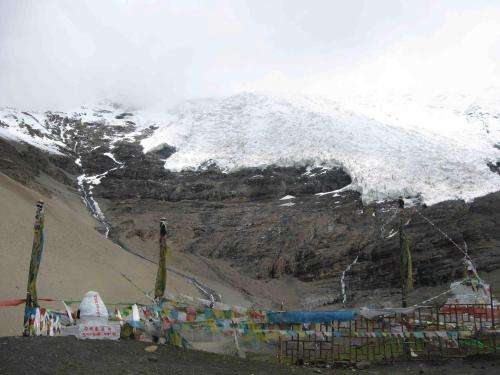Melting glaciers have big carbon impact, study shows

As the Earth warms and glaciers all over the world begin to melt, researchers and public policy experts have focused largely on how all of that extra water will contribute to sea level rise.
But another impact lurking in that inevitable scenario is carbon.
More specifically, what happens to all of the organic carbon found in those glaciers when they melt?
That's the focus of a new paper by a research team that includes Florida State University assistant professor Robert Spencer. The study, published in Nature Geoscience, is the first global estimate by scientists at what happens when major ice sheets break down.
"This is the first attempt to figure out how much organic carbon is in glaciers and how much will be released when they melt," Spencer said. "It could change the whole food web. We do not know how different ecological systems will react to a new influx of carbon."
Glaciers and ice sheets contain about 70 percent of the Earth's freshwater and ongoing melting is a major contributor to sea level rise. But, glaciers also store organic carbon derived from both primary production on the glaciers and deposition of materials such as soot or other fossil fuel combustion byproducts.
Spencer, along with colleagues from Alaska and Switzerland, studied measurements from ice sheets in mountain glaciers globally, the Greenland ice sheet and the Antarctic ice sheet to measure the total amount of organic carbon stored in the global ice reservoir.
It's a lot.
Specifically, as glaciers melt, the amount of organic carbon exported in glacier outflow will increase 50 percent over the next 35 years. To put that in context, that's about the amount of organic carbon in half of the Mississippi River being added each year to the ocean from melting glaciers.
"This research makes it clear that glaciers represent a substantial reservoir of organic carbon," said Eran Hood, the lead author on the paper and a scientist with the University of Alaska Southeast. "As a result, the loss of glacier mass worldwide, along with the corresponding release of carbon, will affect high-latitude marine ecosystems, particularly those surrounding the major ice sheets that now receive fairly limited land-to-ocean fluxes of organic carbon."
Spencer said he and his colleagues are continuing on this line of research and will do additional studies to try to determine exactly what the impact will be when that carbon is released into existing bodies of water.
"The thing people have to think about is what this means for the Earth," Spencer said. "We know we're losing glaciers, but what does that mean for marine life, fisheries, things downstream that we care about? There's a whole host of issues besides the water issue."
More information: Storage and release of organic carbon from glaciers and ice sheets , DOI: 10.1038/ngeo2331
Journal information: Nature Geoscience
Provided by Florida State University



















